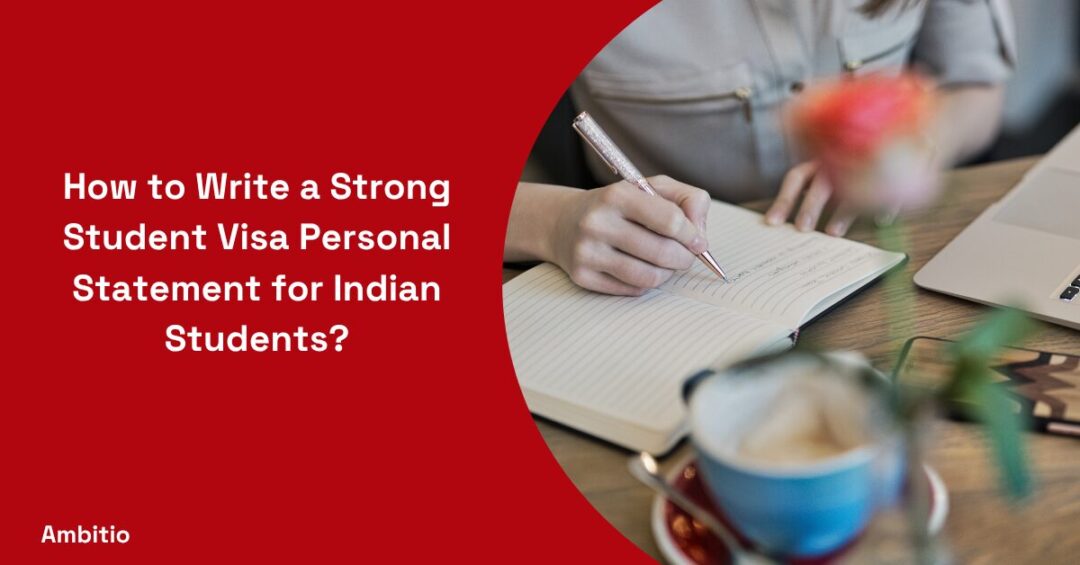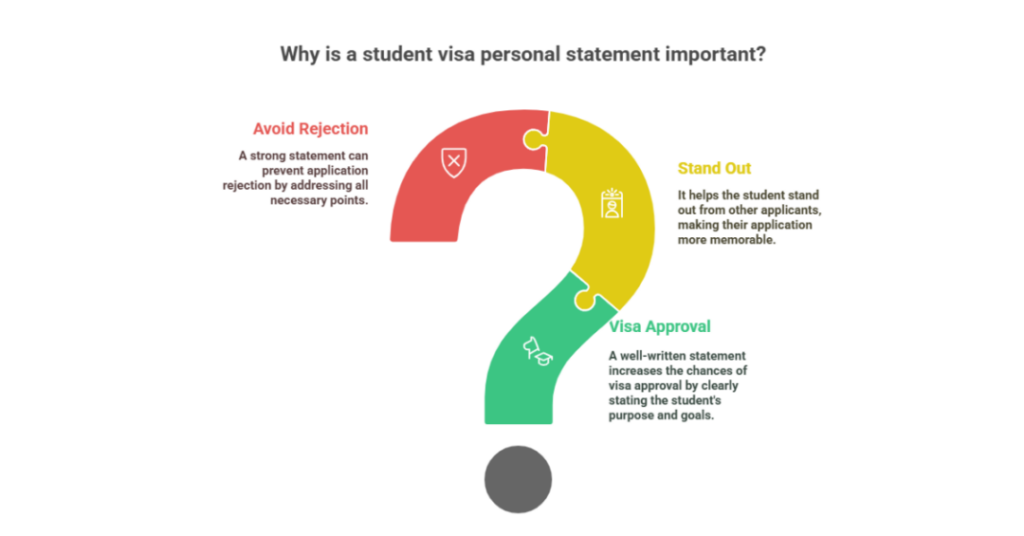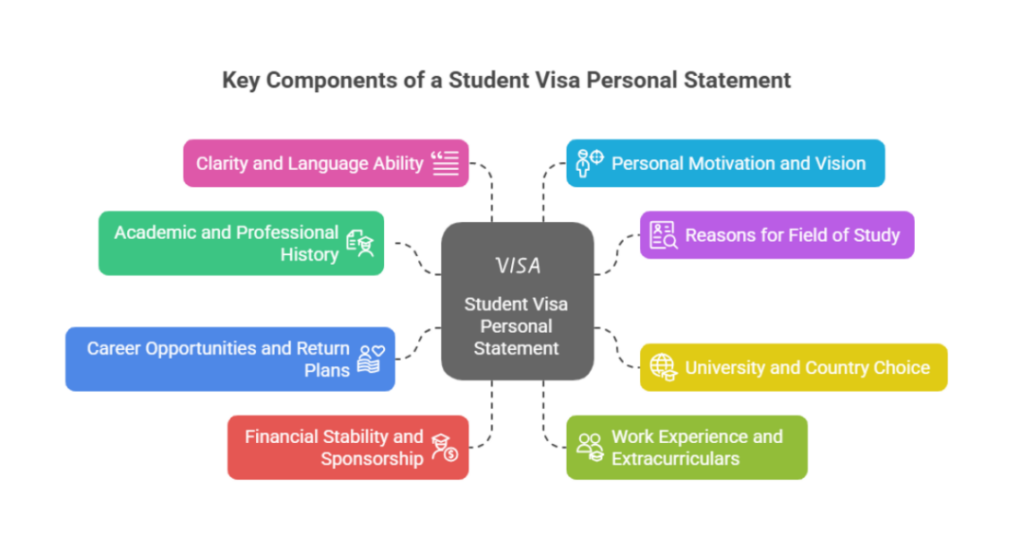2 June 2025
8 minutes read
How to Write a Strong Student Visa Personal Statement for Indian Students?

Key Takeaways
- Student visa personal statement is the most critical part of your application and often the reason behind acceptance or rejection.
- Tailor your SOP to the course, university, and country, while showing clear goals and a plan to return to India.
- Use real experiences, avoid generic templates, and focus on clarity to truly stand out as an international student.
More than 25% of Indian students get rejected for a student visa because of poorly written or unclear personal statements. To be frank: 95% of SOPs sound robotic, nicer than humanly possible, and filled with vague aspirations. Visa officers and admissions officers want clarity, not clichés.
If you cannot clearly state your intentions for studying a certain course or how it fits into your career goals, this is a red flag. A clear, well-constructed student visa personal statement can change everything, and this guide shows you how.
What is a Student Visa Personal Statement and Why Does it Matter for Indian Students?
A student visa personal statement is a concise statement of purpose that explains why an Indian student wants to study a specific course at a university abroad. It’s a crucial part of the visa application process and often determines visa approval.

As an international student, you must submit a Statement of Purpose (SOP) that highlights your academic and professional background, career goals, and reasons for choosing your study destination. A well-written SOP helps you stand out from the crowd and avoid rejection of the application.
What should be included in a student visa personal statement?
A student visa personal statement is a crucial part of your application to study abroad. For Indian students, it must convince both admissions officers and visa officers that you’re a genuine, well-prepared applicant.

Whether you’re applying to the best universities in UK, Canadian colleges, or for an Australian student visa, a strong SOP can make or break your chances. Here’s what to include to make your SOP for student visa compelling and credible:
1. Clear Academic and Professional History
Start by highlighting your academic and professional background, including GPA, test scores like IELTS, TOEFL, GRE, GMAT, or SAT, and relevant coursework. Show how your journey aligns with the course you’re applying for and why you’re a good fit for top schools like MIT, the University of Oxford, or Imperial College London.
2. Genuine Reasons for Choosing the Field of Study
Explain why you want to study this field of study and how it connects to your future career goals. Avoid copying from SOP samples, this should reflect your personal passion. A well-written personal statement must communicate your commitment and clarity.
3. Why This Particular University and Country
Discuss your reasons for choosing a particular university and study destination like Canada, the UK, or Australia. Mention specific courses, faculty, research, or facilities that stood out to you. This helps make your SOP for your student visa feel personal and informed.
4. Career Opportunities and Return Plans
Mention your career opportunities after graduation and how your study abroad experience will help you return to India and contribute to your home country. This reassures the visa officer of your intent and boosts your chances of visa approval.
5. Financial Stability and Sponsorship Details
Include information about your financial stability, scholarships, or sponsorship. This is a key part of your visa SOP. If you’re applying for scholarships for international students, list them clearly to strengthen your application process.
6. Relevant Work Experience and Extracurricular Activities
Add work experience, internships, and extracurricular involvement that support your academic goals. For a UCAS application or SOP for Canada, these details show your well-rounded profile and can grab the reader’s attention.
7. Clarity, Conciseness, and Proof of Language Ability
Your SOP should be concise, clear, and structured. Don’t just write; edit your personal statement for grammar, tone, and logic. As a statement as an international student, also showcase your ability to follow instructions and communicate effectively in English.
8. Personal Motivation and Long-Term Vision
A strong SOP reflects not just where you’ve been but where you’re headed. Explain why you chose this path and how it fits your long-term goals. This gives your student visa personal statement depth and makes it resonate with the reader’s attention.
Including these key points will help Indian students write an effective SOP that strengthens their university application, improves their chances at top universities like Harvard, Stanford, or Cambridge, and ultimately leads to visa approval.
Expert Tips to Make Your Personal Statement for Student Visa Application More Impactful
Crafting a student visa personal statement is more than just a formality, it’s your chance to justify your academic intent, clarity of purpose, and eligibility as an international student.
For Indian students applying to popular study destinations like the UK, Canada, or Australia, a weak SOP may lead to rejection. Here are top tips to make your SOP more compelling and impactful:
1. Start With a Hook That Reflects Your Intent
Your opening should immediately grab the reader’s attention, start with a personal anecdote or a defining moment that made you choose to study your current field. Avoid generic intros; writing SOP means showing, not telling.
2. Tailor It for the University and Country
Whether you’re applying to study at a UK university, for Canada study, or a SOP for Australia student visa, mention what excites you about the academic environment there. Personalizing your SOP shows research and sincerity.
3. Use SOP Samples Only for Structure, Not Content
SOP samples are for reference, not copying. Admissions officers spot template-based writing instantly. Indian students must write an SOP that reflects their real journey, not someone else’s.
4. Show Your Academic and Career Clarity
Clearly outline what you want to study, why, and how it aligns with your career goals. If you need to write about shifting fields, justify it with solid reasoning. This is crucial when you submit a statement for a visa.
5. Edit Ruthlessly and Be Concise
After writing, invest in personal statement editing. A well-edited personal statement as an international applicant demonstrates professionalism. Ensure that your SOP is clear, coherent, and free from fluff or grammar errors.
6. Back Your Story with Specifics
Support your goals with evidence: past achievements, projects, internships, or volunteer work. This makes your student visa personal statement more credible and helps it stand out from visa samples filled with vague goals.
7. Don’t Ignore the Visa Officer’s Perspective
Always remember your SOP is part of your visa application, not just your university application. Address potential red flags, prove intent to study at a university, and show financial and academic readiness, especially for Indian students.
By following these tips on writing, you can create a strong SOP that not only avoids the rejection of your application but also positions you as a serious, committed candidate to study in UK, Canada, or Australia.
Sample Structure for Indian Students Applying for a Student Visa
When Indian students apply for a student visa, they must submit a statement that not only showcases academic qualifications but also justifies their intent to study, career goals, and commitment to returning to their home country.
A well-structured SOP reduces the risk of rejection of their application and helps them make their SOP stand out from a generic visa- sample. Here’s one of the best personal statement examples crafted specifically for this purpose:
Student Visa Personal Statement Sample
I’ve always believed that real growth lies at the intersection of learning and application. This belief has guided my journey from being a curious child fascinated by how mobile apps work to a tech-savvy graduate eager to contribute to scalable software solutions. Today, I’m applying to pursue an MSc in Computer Science at the University of Manchester, a program I see not only as an academic opportunity but as a transformative experience aligned with my long-term goals in data-driven innovation.
I completed my Bachelor of Engineering in Information Technology from Mumbai University, where I focused heavily on backend development, algorithms, and data structures. During my third year, I led a university project on predictive analysis in e-commerce, which exposed me to machine learning and its practical value. This experience deeply influenced my academic interests, compelling me to seek advanced expertise in this domain.
Beyond the classroom, I interned at two startups and contributed to a freelancing project that involved building a RESTful API for a real-time delivery app. This practical exposure taught me the value of teamwork, user-focused design, and project accountability. What I lacked, however, was the structured academic framework to build scalable, secure systems—something I aim to gain through this course.
The UK stands out as a popular study destination for its tech-centric curriculum, global student network, and emphasis on research. The University of Manchester, in particular, offers a curriculum that aligns perfectly with my interests in AI, database systems, and cloud computing. I am especially excited about its Innovation Centre and access to research labs, which I see as fertile ground to sharpen both my technical and entrepreneurial skills.
As an international student, I understand the importance of integrating into a new academic and social environment. My experiences organizing university tech fests and volunteering with Teach For India have helped me grow into a collaborative, socially aware individual. I believe these qualities will allow me to contribute meaningfully to both academic groups and peer communities abroad.
Upon completing the course, I plan to return to India and work with companies focusing on digital public infrastructure and education technology. My ultimate goal is to build scalable, inclusive tech solutions for rural India, where access and affordability remain major barriers. This course is not just an academic endeavor; it is a key step toward that larger mission.
I have the academic grounding, project experience, and clear long-term goals to make the most of this opportunity. I assure you that my intent to study at a university abroad stems from a deep-rooted desire to contribute meaningfully to my field and society at large.
What Works and Why
- Clarity of Purpose: The applicant clearly states why they want to study and how the course aligns with their future plans.
- Balanced Tone: The SOP reflects ambition, preparation, and realism—key traits that visa officers appreciate.
- Specificity: From naming the particular university to highlighting project work and volunteer experience, every section is tailored.
Improvements You Can Learn From
- Add Financial Clarity: A brief mention of funding (savings, sponsor, or loan) would assure officers of financial readiness.
- Tighten Conclusion: The last paragraph can more strongly reinforce return-to-India intent to eliminate ambiguity.
- Formal Language: While conversational, certain areas (e.g., “tech-savvy” or “eager to contribute”) can be made more formal for a visa audience.
Conclusion
Crafting a winning student visa personal statement is no longer optional, it’s the make-or-break factor for Indian students aiming to study abroad. A weak SOP can lead to rejection, while a compelling one can open doors to world-class education. So, if you’re ready to write a personal statement that truly reflects your journey and goals, let Ambitio help you make your SOP stand out
Join Ambitio today, India’s trusted study abroad consultancy with expert mentors, SOP editing, and powerful profile building tools tailored for global success.
Ready to stand out? Schedule a call and build your dream profile now!
FAQs
What is a student visa personal statement?
A student visa personal statement is an essay that explains your academic background, reasons for studying abroad, and future goals to support your visa application.
Why is a student visa personal statement important?
A student visa personal statement helps visa officers understand your genuine intent to study, your preparedness, and your long-term plans, increasing your chances of approval.
What should I include in my student visa personal statement?
You should include your academic achievements, reasons for choosing the course and country, career aspirations, relevant experiences, and how the program fits your goals.
How long should a student visa personal statement be?
The length of a student visa personal statement typically ranges from 400 to 700 words, but always check the specific requirements of the country or university.
How do I make my student visa personal statement stand out?
Make your student visa personal statement unique by sharing personal stories, demonstrating passion for your subject, and clearly linking your background to your future plans.
Can I use the same student visa personal statement for multiple applications?
While you can use a similar structure, tailor each student visa personal statement to address the specific course, university, and country requirements for each application.
What are common mistakes to avoid in a student visa personal statement?
Avoid exceeding word limits, including irrelevant or negative information, exaggerating achievements, and submitting without proofreading your student visa personal statement.

You can study at top universities worldwide!
Get expert tips and tricks to get into top universities with a free expert session.
Book Your Free 30-Minute Session Now! Book a call now




























